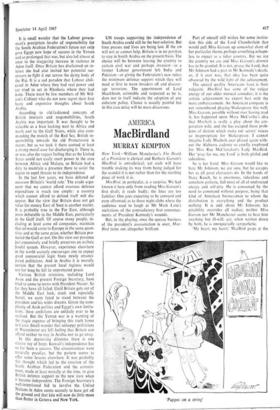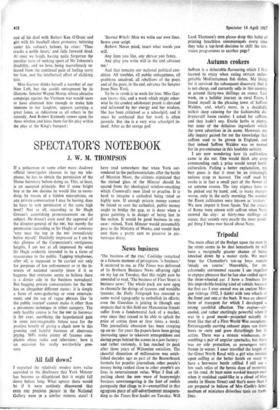MacBirdiand
AMERICA MURRAY KEMPTON
New York—William Manchester's The Death of a President is clerical and Barbara Garson's MacBird is anti-clerical; yet each will have trouble making its way from being judged for the scandal it is not rather than for the startling piece of work it is.
MacBird, in particular, is a surprise. We had known it here only from reading Miss Garson's first draft; it reads badly; the lines are too familiar. One goes expecting to be annoyed and even affronted, as to those night clubs where the audience used to laugh at Mr Mark Lane's recitations of the contradictory first announce- ments of President Kennedy's wounds.
But, in the playing, once the queasy business of the president's assassination is over, Mac- Bird turns out altogether brilliant. Part of oneself still wishes for some institu- tion this side of the Lord Chamberlain that would pull Miss Garson up somewhat short of her particular theme, perhaps something as hope- less to expect as a tidier country. But we are the country we are and Miss Garson's donnee has to be granted. It is not, praise the Lord, that Mr Johnson had a part in Mr Kennedy's death; or, if it ever was, that idea has been quite obscured by the wild light of the achievement.
The special quality Americans have is their vulgarity. MacBird has some of the vulgar energy of our older musical comedies; it is the artistic achievement we export best with the most embarrassment. An American company is not remembered playing Shakespeare this well; Miss Garson, possibly without ever having read it, has happened upon Mary McCarthy's idea that Macbeth is really a play about the cor- poration wife; and she has escaped those prob- lems of diction which make our actors' voices so inappropriate for Shakespeare. I cannot imagine Lady Macbeth ever played again with- out the Alabama cadence so cruelly employed for Miss Rue McClanahan's Lady MacBird. Her 'pray for me, my Lord' is both pitiful and ridiculous.
So is her Lord. Miss Garson would like to hate Mr Johnson, we are sure, but he escapes her as all great characters do. In the hands of Stacy Keech, he is enormous, ridiculous and somehow pathetic, full most of all of undirected energy and self-pity. He is consumed by the need to command without purpose, being that kind of American businessman to whom the distribution is everything and the product nothing. It is odd about Mr Johnson; his pitiability overrides all malice; neither Miss Garson nor Mr Manchester seems to bear him anything but ill-will; yet, when written down by both, he is unexpectedly sympathetic.
'My heart, my heart,' MacBird gasps at the end of his duel with Robert Ken O'Dunc and girt with his baseball chest protector, tottering under his vulture's helmet, he cries: 'Thus cracks a noble heart,' and falls forward dead. At once we laugh, having quite forgotten the peculiar taste of making sport of Mr Johnson's disability, and we love, being marvellously re- leased from the continual pain of feeling sorry for him, and the intellectual effort of disliking him.
Miss Garson thinks herself a member of our New Left, but she avoids entrapment by its illusions. Senator Wayne Morse, whose abrasive campaign against the Vietnam war would seem to have alienated him enough to make him immune to her laughter, appears carrying a great lance, as ridiculous, as all others in the comedy. And Robert Kennedy comes upon the three witches and hires them for his play within the play at the King's banquet : 'Second Witch: Man we write our own lines. Screw your script.
Robert: Never mind, insert what words you will.
Any lines you like, any phrase you fancy, Any play you write will in the end advance me: And that remains our national political con- dition. All troubles, all public unhappiness, all problems unsolved, all rebellions of the poets and of the poor, in the end, advance the Senator from New York.
To be in revolt is to work for him. Miss Gar- son knows this, and a work which might other- wise be the crudest adolescent prank is elevated and informed by her energy and. her wisdom. She has been criticised as a schoolgirl, and it must be confessed that her work is often juvenile. But she is a very wise schoolgirl in- deed. After us the savage god.































 Previous page
Previous page